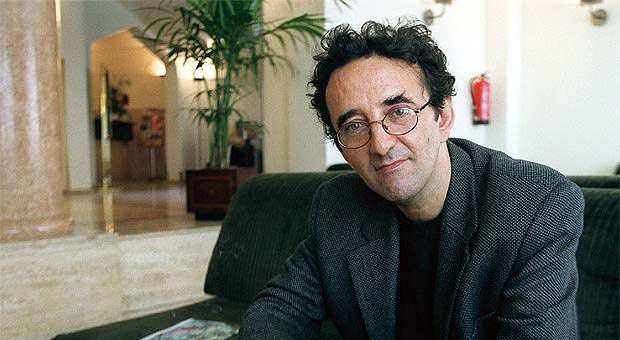That mix of guru and diva of American television that Oprah Winfrey is, recommended his books. Singer Patti Smith, in shock after reading it, put music to his texts. In ¨Now You See Me, ¨ recent super Hollywood production , one of the protagonists appears reading ¨The Savage Detectives.¨ And Juan Villoro says in New York he met “two young writers who paid $ 50 for the page proofs of ¨2666¨ to read that book before anyone else.” On the other hand, the Mexican writer also met in his country an aspiring poet at the height of happiness because he managed to pet a dog that, as he was told, when puppy had met the author of ¨Distant Star¨ (“The teacher chooses the disciple, “a famous blind wrote,” but the book does not choose its readers, who may be evil or stupid “).
The Chilean writer Roberto Bolaño, for not few readers, is the new prophet. In fact, there are many out there who would even solemnly swear it with a hand on The Savage Detectives or perhaps over 2666. Others, of course, overlook his work with the “prior fervor” and “mysterious loyalty” that Borges attributed to the reading of the classics. Neither advertising fanfare surrounding his person, nor the hysterical excitement that his books arouse today, or the stupidity that sometimes hides behind such enthusiasm, are arguments to deny an undeniable fact: Bolaño is one of the greats.
In Cuba, with the exception of two or three anthologies, he has not been published, for which surely there are several explanations (the first, I guess, is the question of rights). Despite this, people manage to read him here thanks to the infinite goodness of people- friends, family, strangers who serve as messengers, coming from Spain, Argentina, Mexico, U.S. and so on. We have also been fortunate that a Venezuelan edition of The Savage Detectives (Monte Avila Editores, 2007) to circulate among us, a novel that deserved, in 1999, the coveted Rómulo Gallegos Novel International Award.
Roberto Bolaño was born in 1953, year in which a dictator and a poet died, and died in 2003, just in time to glimpse, it is conceivable that scared, the fame that future would have in store for him and the cult that his books would be object of.
On Thursday, December 5, under the Nietzschean title of «Así habló Bolaño», which insinuates his prophet condition, the Casa de las Americas dedicate a tribute day to Chilean writer, in reference to the sixtieth anniversary of his birth and the tenth of his death. Storytellers and essayists will gather there to share and exchange views about him and his work, which is an unprecedented event in Cuba. The most recent issue of the magnificent magazine Upsalón, containing a dossier dedicated to the Chilean writer, will also be presented. To close the day, it will be screened the documentary ¨El ultimo maldito¨, by Spanish director Jose Luis Lopez-Linares.
However, in all this there is a symmetry that not for insignificant stops being unique: over a few hours, the work of Roberto Bolaño will claim protagonism in Casa de las Americas, just as this place, along few paragraphs, becomes protagonist, or nearly so, in Roberto Bolaño´s work.
Let me explain.
The Savage Detectives collects two moments, very brief, in which this Havana institution becomes target of the sharp and funny onslaughts of the Chilean. In one case, the Argentine poet Fabio Ernesto Logiacomo explains how a collection of poems of him strangely won the Casa de las Américas Award, in 1975. Let me quote him:
“I came to Mexico in November 1975. […] I was 24 and my luck was changing. […] While vegetating in Panama I heard that I had won the Casa de las Américas poetry prize. […] Well, the funny thing was that I had not competed that year in that contest. […] The previous year I had sent them a book and it not even get a sad honorable mention. […] At first I thought I was hallucinating. [ …] Then they told me that the previous year book had been misplaced and that kind of stuff. “
This passage, like many others in the work of Roberto Bolaño and specifically in this novel, is partly autobiographical. Just in 1975, the Chilean-who by then was 22 and not 24-, opted for Casa de las Americas’ poetry prize, but his book of poems, written in collaboration with Bruno Montane, although finalist was not the winner.
In its issue 92, corresponding to the months of September-October 1975, the Casa de las Américas magazine published some poems included in the finalist books of the poetry prize, including three by the duo Bolaño -Montane: “John Reed”, “Carta” and “En el pueblo. ”It is likely, therefore, that these poems to be among the first published by the Chilean writer. (Another insignificant and peculiar coincidence: in the same issue of that magazine there is a text by Cuban writer Antonio Benítez Rojo, who, twenty four years later, would integrate the Rómulo Gallegos Prize jury that ruled in favor of The Savage Detectives.)¨
These poems attest, first, that the Roberto Bolaño of 1975 was far from being an original poet, if he ever came to be it. And, secondly, that his relationship with Casa de las Americas, or vice versa, is older and closer than it looks.










